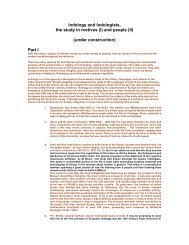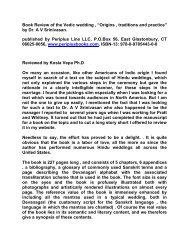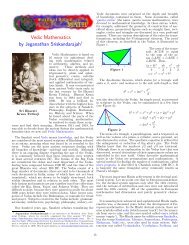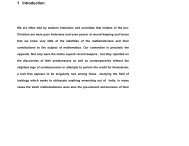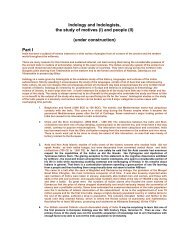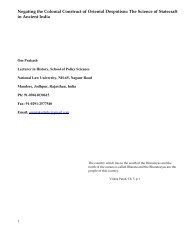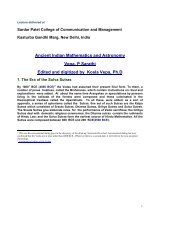The Dhaarmik Traditions - Indic Studies Foundation
The Dhaarmik Traditions - Indic Studies Foundation
The Dhaarmik Traditions - Indic Studies Foundation
You also want an ePaper? Increase the reach of your titles
YUMPU automatically turns print PDFs into web optimized ePapers that Google loves.
<strong>The</strong> fruit that one obtains of acts consists of pleasure and pain, of existence and nonexistence.<br />
By knowledge, one attains to that where there is no occasion for grief;<br />
where one becomes freed from both birth and death; where one is not subject to<br />
decrepitude; where one transcends the state of conscious existence. By knowledge,<br />
one attains to Brahman, which is Supreme, Unman fest, immutable, ever-existent,<br />
imperceptible, above the reach of pain, immortal, and transcending destruction; where<br />
all become freed from the influence of all pairs of opposites (like pleasure and pain,<br />
heat and cold, insults and compliments, happiness and unhappiness etc., where all<br />
become freed also of wish or purpose.<br />
Reaching that stage, they cast equal eyes on everything, become universal friends and<br />
devoted to the good of all creatures. <strong>The</strong>re is a wide gulf, O son, between one devoted<br />
to knowledge and one devoted to acts. Know that the man of knowledge, without<br />
undergoing destruction, remains existent forever like the moon on the last day of the<br />
dark fortnight existing in a subtle (but undestroyed) form.<br />
As regards the man devoted to acts, his nature may be inferred from beholding the<br />
newborn moon, which appears like a bent thread in the firmament (subject to growth<br />
and decay). That person of acts takes rebirth with a body with eleven entities for its<br />
ingredients, that are the results of modification, and with a subtle form that represents<br />
a total of six and ten. <strong>The</strong> deity who takes refuge in that (material) form, like a drop of<br />
water on a lotus leaf, should be known as Kshetrajna (Soul), which is Eternal, and<br />
which succeeds by Yoga in transcending both the mind and the knowledge.<br />
[Note: <strong>The</strong> soul resides in the body without partaking of any of the attributes of the<br />
body. It is, therefore, likened to a drop of water on a lotus leaf, which, though on the<br />
leaf, is not yet attached to it, in so much that it may go off without at all soaking or<br />
drenching any part of the leaf.]<br />
Tamas, Rajas, and Sattva are the attributes of the knowledge. <strong>The</strong> knowledge is the<br />
attribute of the individual soul residing within the body. <strong>The</strong> individual soul, in its turn,<br />
comes from the Supreme Soul. <strong>The</strong> body with the soul is said to be the attribute of jiva<br />
(embodied soul). It is jiva that acts and cause all bodies to live.<br />
___________________________________<br />
Of knowledge there is no end<br />
From <strong>The</strong> Mahabharata<br />
Aswamedha Parva, Section XLIV<br />
Translated by Sri Kisari Mohan Ganguli<br />
80



